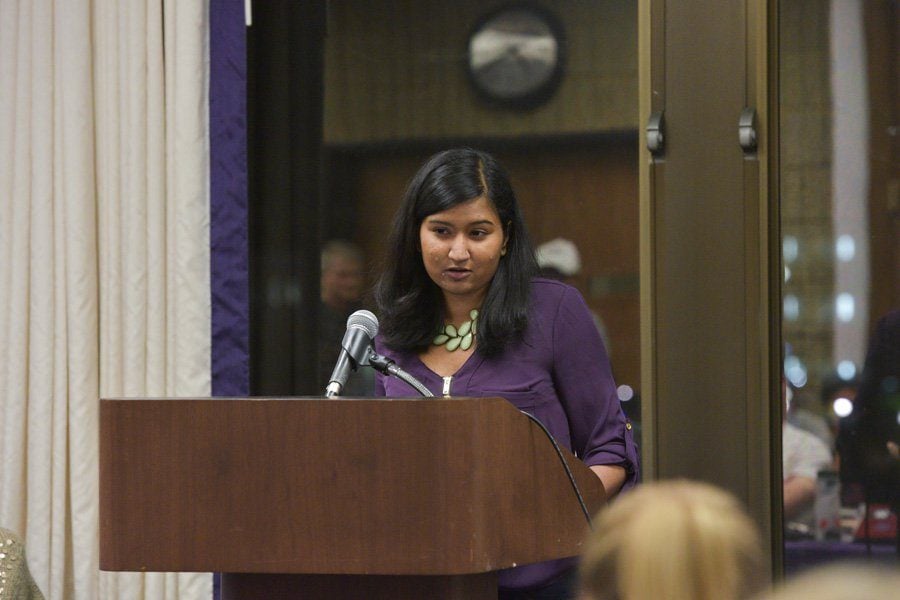ASG Senate approves code change regarding sexual misconduct
Daily file photo by Ingrid Cherry
SESP junior Sumaia Masoom speaks during ASG Senate in October. Masoom, who was then vice president of student life, helped draft a bill with executive vice president Macs Vinson on sexual misconduct accountability among ASG members.
March 9, 2017
Associated Student Government Senate unanimously approved a change to its code Wednesday that asks members of ASG found responsible for sexual misconduct to resign from their positions.
The bill, which is now part of the ASG code, enacts a policy mandating every member of ASG sign an agreement stating they will voluntarily resign if found responsible for sexual misconduct. The only person who will have access to that information is the ASG adviser, according to the bill.
“ASG stands with, and unequivocally believes, survivors,” the code change states. “In pursuit of this, ASG will not condone the actions of perpetrators by protecting them or allowing them to work on behalf of the organization.”
The bill was authored by Sumaia Masoom, former co-vice president for student life, and executive vice president Macs Vinson. The bill comes on the heels of Senate passing a resolution last week aiming to strengthen accountability for sexual assault. The resolution came in response to the University notifying students on Feb. 6 of an anonymous report that four female students were potentially given a date rape drug at the Sigma Alpha Epsilon fraternity on Jan. 21. The report alleges that two of the female students believe they were sexually assaulted.
In the security alert sent to students, Chief of Police Bruce Lewis also said the University received an anonymous report alleging another student was sexually assaulted, possibly with the use of a date rape drug, at a second, unnamed fraternity. Since the announcement early last month, University has yet to release any further information publicly on the matter.
Masoom, an author of the recently passed bill, resigned as co-vice president for student life in October, saying she wanted to prioritize her personal health. When the bill was introduced at last week’s meeting, Masoom said she had always wanted to address the issue of sexual assault in Senate.
“After I left ASG, I realized, ‘Hey ASG has absolutely no accountability for sexual assault among its own members,’” the SESP junior said. “That’s something that should be common sense. If we don’t hold ourselves accountable, how are we supposed to protect other students?”
The bill gives any student found responsible of sexual misconduct the opportunity to appeal whether or not they should have to voluntarily resign to the ASG adviser. However, the adviser will only hear appeals if the act of sexual misconduct did not harm any person, such as an instance of indecent vandalism. Although all members of ASG will be required to sign the agreement, they will not be automatically removed from ASG if found responsible and will have to voluntarily give up their position.
Vinson said he expected that any ASG member found responsible of sexual misconduct would voluntarily resign. These agreements already exist in other student groups on campus, including Men Against Rape and Sexual Assault and Sexual Health and Assault Peer Educators, he said.
“We’re ensuring that we do not house or aid and abet people who are responsible for sexual misconduct on this campus,” he said.
In what was the last Senate meeting of Winter Quarter, Senate also heard a presentation about possible changes to the academic calendar and approved all B-status funding.
Email: [email protected]
Twitter: @thejonahdylan


